Inside the chapel on the Crestmont Campus in Rancho Palos Verdes, California, colourful ribbons were waving, beach balls were flying and Jon Psaute was on stage signing Friend of God in American Sign Language as part of the worship band for the U.S.A. Western Territory’s second Adaptive Retreat.
The Adaptive Retreat, held in April, invited attendees to “Bloom Boldly,” creating space for worship and joy. According to Major Nancy Helms, director of disabilities ministries for the U.S.A. Western Territory, the weekend is a glimpse into the kingdom of God the way she thinks God intended us to experience it. The World Health Organization reports that members of the disability community represent an estimated 16 percent of the world’s population, making them the largest marginalized group—one that is often excluded from the church, too.
“This is a more full picture,” says Major Helms. “That excites me, because I think we all benefit from that—giving seats of honour to the people Jesus told us to, and I think God’s honouring it. It’s just a beautiful picture of what the body of Christ should look like. We’re missing a lot of parts. When you come to events like this, the body’s way more complete.”
This year, 27 delegates attended the retreat, including two from Canada (along with their caregivers). Major Pamela Maynor, director of mission and ministry training at the College for Officer Training in the U.S.A. Eastern Territory, was the guest speaker for the weekend.
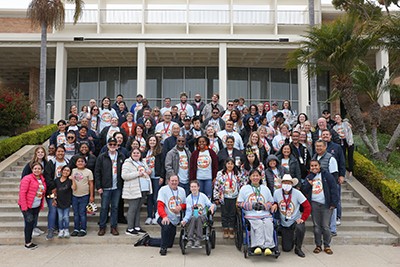
“I think this community is so often not included in church services, not out of a want to exclude, but out of an ignorance of knowing how to include,” Major Maynor says. “This not only embraces this community, but in a way, welcomes us into their community to learn from them.”
Over three sessions, Major Maynor spoke about being fearfully and wonderfully made, blooming with the body of Christ and sharing your beauty. “Worship was so free,” she says. “There were no judgments, just worship.”
In addition to the main sessions, attendees participated in a variety of activities, such as choir, karaoke, movie nights and shared meals. Throughout the weekend, care was given to create spaces to accommodate a range of needs for the delegates, such as offering ear plugs and creating lower-stimulation areas. Additionally, time was dedicated for caregivers to connect.
Every caregiver’s experience is different, says Gerriann Armstrong, noting she’s attended the retreat with her son both years. “The best part is seeing the growth, and then the connection with people who understand,” says Armstrong, who believes it’s time to consider what’s next. With many delegates who have aged or are aging out of activities designed for those under 18, what exists for them?
“There’s this group of 18- to 35-year-olds that we need to be looking at,” she says. “Where do they fit within our corps? Where do they fit within our organization and our churches? What can we do to make sure that we’re promoting that inclusivity in our community?”
Major Helms says many people have misconceptions about having a disability ministry. “We think a disability ministry is this hard, impossible thing. But as you can see from this retreat, it’s not hard to do,” she says. “Even though there were people there with probably 20 different disabilities, everybody had a place at the table. They all worshipped in their own way, and that’s beautiful.”
Blooming Boldly
Many Christians have various teachers, religious leaders and spiritual mentors who speak into their faith and encourage them as they grow as believers. For Canadian Salvationist Josh McDonald, his primary teacher of faith has always been his mom, Captain Kristen Gray, who is the corps and community ministries officer in Woodstock, Ont. Together, Josh and Captain Gray attended this year’s Adaptive Retreat where he shared his testimony (see sidebar) and sang his own rendition of You’ve Got a Friend In Me from Toy Story at karaoke night.
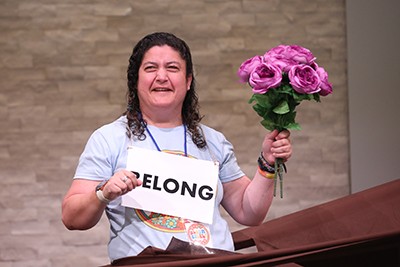
“Josh never ‘fit’ in Sunday school classes or other corps activities because they can be socially uncomfortable for him. So, to see him at the Adaptive Retreat surrounded by people who made the effort to create an inclusive space for him made my heart so happy,” says Captain Gray. “There was no expectation that he behave a certain way or participate in every activity. He was simply allowed to be himself and to ‘bloom boldly’ exactly as he was comfortable.”
For Captain Gray, the theme “Bloom Boldly” taught delegates that they are uniquely and beautifully made by God, valued by God and others, and that each person has an important purpose.
“I think the overarching message Josh learned was that God loves him exactly as he is, despite the differences he or others may see,” she says.
The Body of Christ
“People living with disabilities are an important part of the body of Christ,” says Captain Carolina Valencia, assistant corps life director, territorial corps mission department, who attended the Adaptive Retreat with her daughter, Natalie Valencia. “Not having them involved or included means the body of Christ is incomplete.”
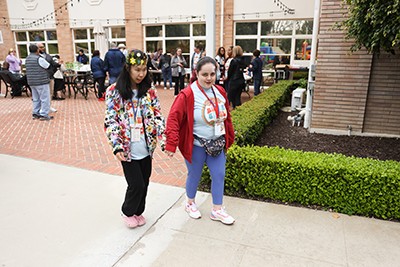
At the retreat, Natalie was able to naturally mingle with peers and share in worship with others that also live with an intellectual disability. According to Captain Valencia, it is important to create these safe, inclusive and accommodating spaces for every person to practise their faith, as well as to create opportunities to raise awareness about people living with different abilities.
“We can follow the example set out by the U.S.A. Western Territory and invest in opportunities such as programs, camps and retreats for people with disabilities and their families, accommodating their needs and removing every possible obstacle so that they can experience the church community as any other person would,” she says.
For mission partners, corps members and friends seeking to support people with different abilities, Captain Valencia offers practical advice: hire them, have them as part of ministry boards, invite them to be part of church ministries, and be their friends and supporters. Invite them to share about their life and spirituality, and sit with them and listen to their stories. Offer support and respite to their caregivers.
“So often we impose limits on people with disabilities when they don’t fit into our norms, rather than allowing their abilities to shine,” explains Captain Gray. “It’s also a challenge for us as leaders to make our churches fully inclusive because disability comes in so many different shapes and sizes. It’s difficult to know how to accommodate all. But Jesus himself demonstrated to us that he prioritized ministry to the outcasts of society.”
As a parent, Captain Gray feels that the Adaptive Retreat was a large step in the right direction toward inclusive ministry. “We’re not going to overcome all the challenges and barriers overnight, but we need to demonstrate that we are making efforts to ensure that everyone made in the image of God finds their rightful place in his kingdom.”
Josh's Testimony
I live with my mom who is a Salvation Army officer and we have lived in four different places in Canada since my mom became a pastor. This includes three places in Ontario and one in Saskatchewan. I do not recommend going to Saskatchewan because it is freezing cold there in the wintertime.
I am very thankful to God for my family which includes my mom, my dad and stepmom, my grandparents and my brother. My brother’s name is Andrew, and he has three daughters—Lexzie, Lylah and Leighton. Leighton just turned five years old on April Fool’s Day. I like to spend time with all my family, and especially enjoy visits with my dad and his dogs, my nieces, and going to Tim Hortons with my grandpa.
Being social is sometimes hard for me but I am thankful for the opportunities that God gives me to make new friends at the programs I go to back home, and to come to California for this retreat to meet some new people and have fun.
Photos: John Docter
This story is from:




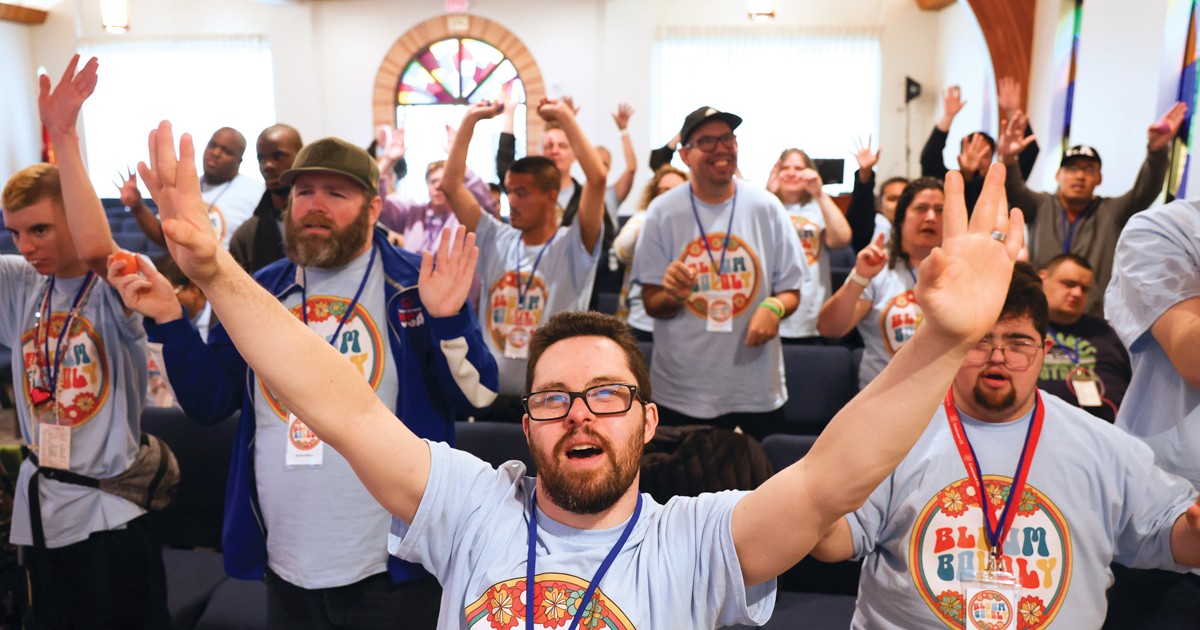

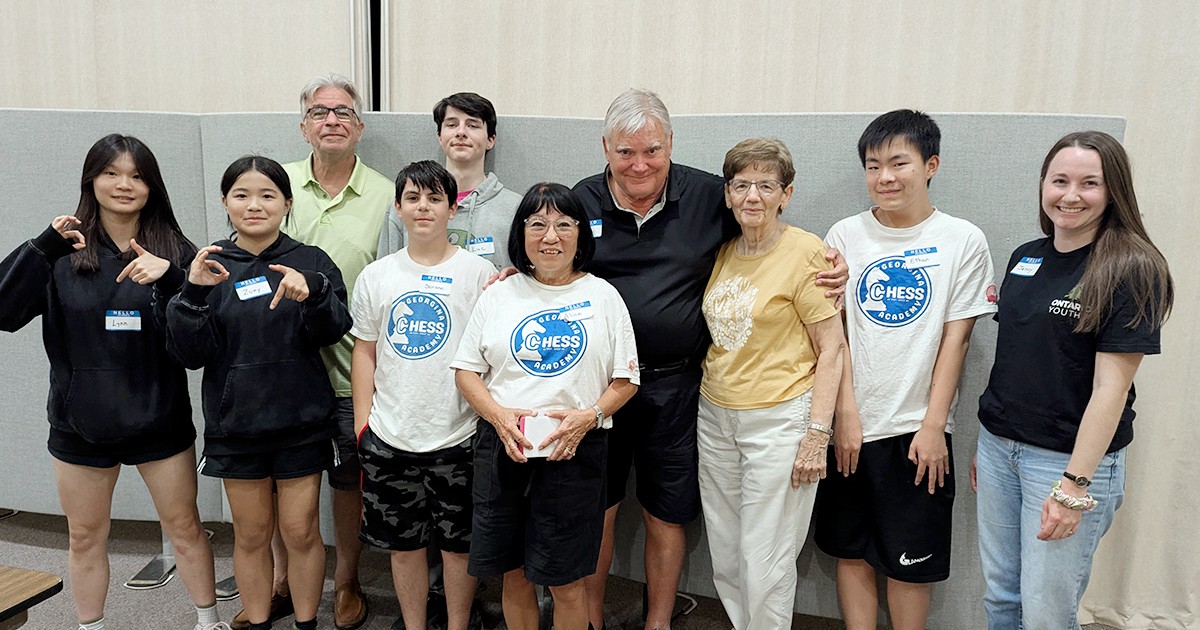



Beautiful story, hope the retreat was energizing for all who attended! Lots we can learn about adapting our current settings as well to accommodate a wider range of individuals who can belong and participate.